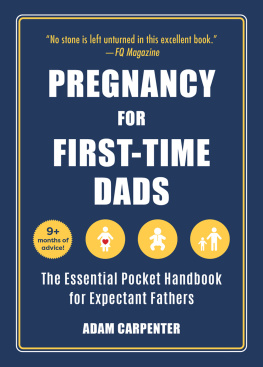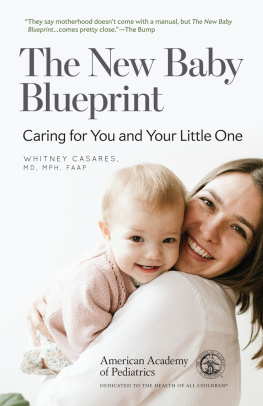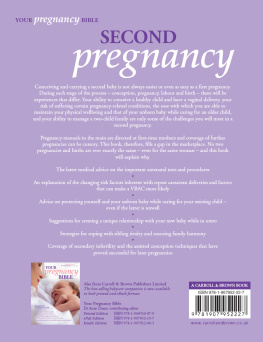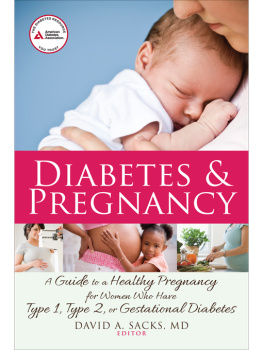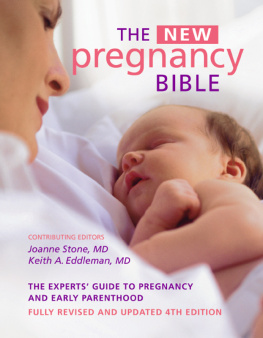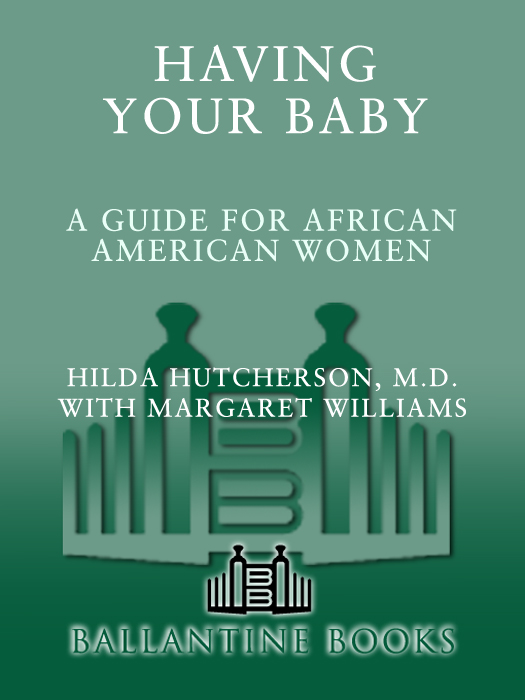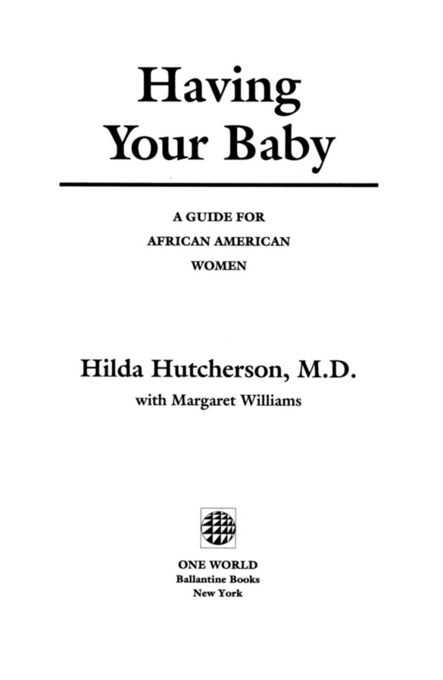More praise for Having Your Baby
A wonderful guide to pregnancy and newborn care. Pregnant black women should make every effort to read this book; it is filled with helpful information.
Alvin F. Poussaint, M.D.
Professor of Psychiatry
Judge Baker Childrens Center and
Harvard Medical School
Having Your Baby is filled with a tremendous quantity of up to date and accurate information. This book should grace the library shelf and be read by all women embarking on the adventure of childbirth.
Perry A. Henderson, M.D.
Professor of Obstetrics and Gynecology
University of Wisconsin Medical School
Pregnancy is a joyful and exciting time but it can also be overwhelming. Finally, there is a book to alleviate the concerns and anxieties of the pregnant Black woman. Having Your Baby: A Guide for African American Women addresses specific needs and questions. Babies should come with a manual, and here it isa book that informs mothers what to expect and how to care for newborns.
Darlene Powell Hopson, Ph.D.,
Clinical psychologist and
Coauthor of Different and Wonderful:
Raising Black Children In A Race-Conscious Society
A One World Book
Published by Ballantine Books
Copyright 1997 by Hilda Hutcherson, M.D., and Margaret Williams
Illustrations copyright 1997 by Keelin Murphy
Illustrations copyright 1997 by Fred Willingham
All rights reserved under International and Pan-American Copyright Conventions. Published in the United States by Ballantine Books, a division of Random House, Inc., New York, and simultaneously in Canada by Random House of Canada Limited, Toronto.
http://www.randomhouse.com
Library of Congress Cataloging-in-Publication
Data Hutcherson, Hilda.
Having your baby : a guide for African American women /
Hilda Hutcherson, with Margaret Williams.
p. cm.
eISBN: 978-0-307-77603-7
1. Pregnancy. 2. Afro-American women. 3. Childbirth.
I. Williams, Margaret. II. Title.
RG525.H88 1997
618.24dc21 CIP 96-46919
v3.1
This book is not intended as a substitute for medical consultation or the medical advice of a physician. The reader should regularly consult with a physician in matters relating to her and her babys health, particularly with respect to symptoms that may require diagnosis or medical attention.

Contents

Acknowledgments
This book is a labor of love that could not have been completed without the help of many people: my husband, Fred; my children, Lauren, Steven, Andrew, and Fredric; and my parents, John and Bernice Hutcherson. I am grateful for the assistance of Margaret Williams, Benilde Little, Regina Cash, Carmen Thompson, Terry Goetz, Carla Glasser, Dr. Anita Lasala, Dr. Paula Randolph, Dr. Sophia Drosinos, Dr. Beverly Anderson, Dr. Gina Brown, Dr. Tracie Burgess, Mary Ann Jonaitis, R.N., CDE, Fran Lavin, PT, illustrators Fred Willingham and Keelin Murphy, and my editor, Ms. Elizabeth Zack. And I am especially grateful to all of the wonderful mothers who allowed me to share in their beautiful, magical experiences of birth!

Introduction
I had been a practicing obstetrician for two years before I became pregnant with my first child, and when that time arrived, I was confident that my medical education had prepared me for all of the challenges of pregnancy. I entered into my pregnancy feeling radiant, beautiful, and special. Still, during the next nine months I observed some unexpected physical changes. My skin and hair changed dramatically. I gained weight rapidly and had to increase my shoe size twice. Normally a calm person, I now had difficulty controlling my emotional swings. (It was during one of these depressive swings when an elderly woman informed me that I must be having a girl, because the baby had robbed me of my beauty.)
Well-meaning advice from family members and friends only added to my anxiety. I was told not to raise my arms above my head or the baby might choke. I was cautioned to avoid spicy foods, and not to have sex late in my pregnancy. I heard that if I showed a bad temper, my baby would end up having a bad temper.
My medical textbooks did not provide the answers to many of my questions about my physical and emotional changes. When I conducted further searches in libraries and bookstores, I still was not successful in finding answers.
Most important, I came to realize that many of my own patients had the same questions and concerns that I had. They also wondered why there was a lack of black mothers and babies in pregnancy books, why healthy babies are always described as being pink, and why the cultural beliefs and practices of the African American community are ignored in the available books.
With a little research I came to realize African American women are disproportionately plagued by a number of medical problems and illnesses, when compared to Caucasian women. We are more likely to suffer from hypertension, diabetes, lupus, obesity, sickle-cell disease, AIDS, and fibroid tumors. We are more likely to live in poverty, have poor nutrition, lack adequate access to good medical care, receive little or no medical care during pregnancy, and to be victims of violence during this time. All of these conditions can have a significant effect on the health of a pregnant mother and her baby, and they contribute to the fact that black babies are twice as likely to be born too small and to die in the first year.
So, during my third pregnancy, I began to write a book about what you can expect, and completed it two years later during my fourth pregnancy. (In fact, I was sitting at the computer finishing the last chapter when my membranes ruptured and labor began!) Having Your Baby provides a positive image and outlook for pregnant black women, and addresses the medical problems that plague expectant black mothers.
No book could ever cover all of the concerns of every black woman, but I have tried to cover the issues that are most significant for black women during pregnancy. By providing you with as much pregnancy care information as possible, I hope to help combat the high incidence of small, sick, and premature black babies. This way you can achieve the ultimate goal: a healthy baby and a healthy you.
I also have presented information that every pregnant woman needs, including preparing your body for pregnancy; the importance of seeking early and continuous prenatal care; what to expect during your pregnancy; a guide to understanding old wives tales and superstitions; what your options are during labor and delivery; and the basics of postpartum care, breast feeding, and the basics of baby care. Some chapters concentrate on diet, exercise, and sex to help your pregnancy be as healthy and pleasurable as possible. This book is meant to help you not only survive pregnancy, but to enjoy the experience!


